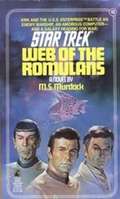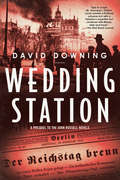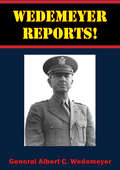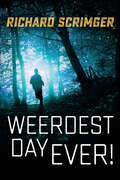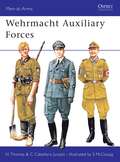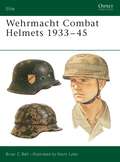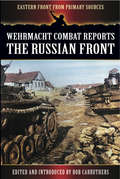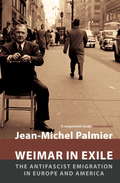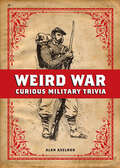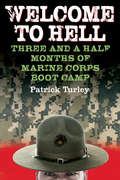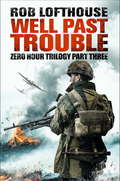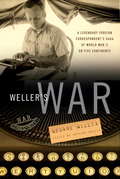- Table View
- List View
Weatherhawk
by Herbert CrowderThe F-22 Weatherhawk. The government's latest top secret aircraft. Every aeronautics firm in America wanted to buy But ex-Vietnam fighter pilot Mark Muldoon had the edge, a new development in radar technology known as JAWS Landing the deal would clinch Muldoon's future. But now this incredible, compact supercomputer is missing JAWS has apparently been stolen. And all hell is about to break loose.... A scorching masterwork of high-tech suspense, Weatherhawk reveals America's hidden world of military technology, power politics, and big business.
Web of the Romulans: A Novel (Star Trek: The Original Series #10)
by M.S. MurdockRavaged by a killer virus, the Romulans enter Canara, where the only antidote can be found. Desperate, they incite a victorious Enterprise attack on one of their vessels -- but Kirk discovers their ruse. Meanwhile the central computer has fallen in love with him severly cripling the Enterprise. Now Kirk must bring the antidote to the Romulans -- before the galaxy crashes over the brink of war!
Wedding Date with the Army Doc
by Lynne MarshallIt started at a wedding... Since her recent lifesaving-and life-changing-operation, Charlotte Johnson has steered clear of romance...but brooding Jackson Hilstead is too delicious to resist! Surely some harmless flirting with the sexy army doc can't hurt? Charlotte knows Jackson has his own emotional battles to fight, but she believes they can be stronger together. So when she accepts his invitation to a family wedding, Charlotte hopes it's a sign that one day she'll be walking down the aisle...with Jackson by her side!
Wedding Station (A John Russell WWII Spy Thriller #7)
by David DowningThe prequel to David Downing&’s bestselling Station series introduces John Russell, an Englishman with a political past who must keep his head down as the Nazis solidify their power.February 27, 1933. In this stunning prequel to the John Russell espionage novels, the Reichstag parliament building in Berlin is set ablaze. It&’s just a month after Hitler&’s inauguration as Chancellor of Germany, and the Nazis use the torching to justify a campaign of terror against their political opponents. John Russell&’s recent separation from his wife threatens his right to reside in Germany and any meaningful relationship with his six-year-old son, Paul. He has just secured work as a crime reporter for a Berlin newspaper, and the crimes which he has to report—the gruesome murder of a rent boy, the hit-and-run death of a professional genealogist, the suspicious disappearance of a Nazi-supporting celebrity fortune-teller—are increasingly entangled in the wider nightmare engulfing Germany. Each new investigation carries the risk of Russell&’s falling foul of the authorities, at a time when the rule of law has completely vanished, and the Nazis are running scores of pop-up detention centers, complete with torture chambers, in every corner of Berlin.
Wedding a Warrior
by Hannah ConwayWHITLEIGH HAYNES, a young college student, plans her future with precision and no intention of ever leaving her Kentucky home, at least not permanently. After the attacks of September 11th, longtime boyfriend COLLIER CROMWELL puts his plans aside to join the Army, ready to serve his God and country anywhere and at any cost. Though devastated by the news, Whitleigh agrees to wait for Collier to return. She settles in to college life without him by her side, dives into volunteer work at an Elementary school, and busies herself with friends and work. Her new normal isn't so bad, in fact, it's better than imagined. She loves the children at the Elementary school, work pays well, and her friends are supportive, though Blaine, a childhood friend, flirts more often than she cares for. Collier unexpectedly proposes shattering Whitleigh's new normal, causing her to wrestle with the boundaries of her limited faith. Outside influences and obstacles demand her attention and leave her wondering what to say to the man who's asking her to leave everything she's ever known, loved, and planned?
Wedemeyer Reports!
by General Albert C. WedemeyerAs the chief planner for General Marshall, and co-author of the Victory Plan, General Wedemeyer had a truly significant hand in shaping and directing the Allied War effort against the Fascist powers. In these brilliant, excellently written memoirs he reveals the planning and execution of Grand Strategy on a global scale that toppled Hitler, Mussolini and Tojo.""The Second World War," says historian Walter Millis, "was administered."...As a war planner in Washington from 1940 into 1943 I was intimately involved in an attempt to see the war whole--and even after I had moved on to Asia, where I served successively on Lord Louis Mountbatten's staff in India and as U.S. commander in the China Theater, I was still close to the problems of adapting Grand Strategy to a conflict of global dimensions.It was inevitable, then, that the subject of Grand Strategy should predominate in this book. I was not deprived of my own share of war experience from close up, but my most strenuous battles were those of the mind--of trying, as we in Washington's planning echelons saw it, to establish a correct and meaningful Grand Strategy which would have resulted in a fruitful peace and a decent post-war world.There were many obstacles in the way of developing a meaningful strategy, of assuring that our abundant means, material and spiritual, would be used to achieve worthy human ends. First, there was the pervasive influence of the Communists, who had their own plans for utilizing the war as a springboard to world domination. Second, there was the obstinacy of that grand old man, Winston Churchill, who, as we soldiers felt, could never reconcile his own concepts of Grand Strategy with sound military decisions. Because we had to contend with the machinations of Stalin on the one hand and with the bulldog tenacity of Churchill on the other, this book has had to be harsh in some of its personal assessments."-Foreword
Weerdest Day Ever! (The Seven Prequels #4)
by Richard ScrimgerBunny is on a camping trip with his brother and his grandpa. How much trouble can he get into? As it turns out, a lot. For one thing, there are soldiers all over the place. Canada is about to go to war with the United States, and the battle starts tomorrow. Bunny is worried. A hockey rivalry is one thing, but this is serious. And why is everybody so happy? Things get personal when an American soldier steals his brother Spencer's cell phone. Bunny decides to track down the phone himself. Maybe they can get out of there before the war starts. That’s when things get confusing. . . In this zany prequel to Ink Meand The Wolf and Me, the hockey-loving, indomitable Bunny goes camping with his brother and his grandpa.
Wehrmacht Auxiliary Forces
by Nigel Thomas Simon MccouaigThough the 'Wehrmachtsgefolge' (Armed Forces Auxiliaries) were generally inferior to their armed forces equivalents, their contribution to the German war-effort was far from negligible. Auxiliaries including the NSKK, Transportkorps Speer, Reichsarbeitsdienst and Organization Todt supported the Wehrmacht in their duties. In 1944, the strength of these organizations peaked at 3,800,000-40% of the size of the armed forces. As they became increasingly aware of their importance, the Auxiliaries introduced uniform and insignia modifications which made them virtually indistinguishable from their comrades in the armed forces. This book examines the organization, uniforms and history of the various Wehrmacht auxiliary forces of World War II.
Wehrmacht Combat Helmets 1933-45
by Kevin Lyles Brian BellThe German Stahlhelm is perhaps the most recognizable image of World War II (1939-1945). Manufactured in its millions, it was used or copied by many countries. It is still one of the most collected relics of the war; but despite its relative availability, prices have reached levels that challenge collectors to protect themselves by acquiring in-depth knowledge. This book, by a collector of 30 years' standing, offers a detailed masterclass in the patterns, component parts and finishes of the combat helmets used by the German Army, Navy and Air Force. It is illustrated with a superb selection of rare period photos, colour photos of collected examples, and striking colour paintings.
Wehrmacht Combat Reports: The Russian Front (Eastern Front From Primary Sources)
by Bob CarruthersThis fascinating collection of Allied reports focusing on the combat actions of the Wehrmacht in Russia is drawn from a variety of wartime sources. Compiled and edited by Emmy Award winning author and historian Bob Carruthers, this absorbing assembly of primary source intelligence reports encompasses rare material drawn from both German and Russian original sources, to provide the reader with a unique insight into how the bitter war in Russia was conducted at the tactical level. This is the unvarnished reality of what it meant to fight in this titanic struggle to the death.Featured in the book are reports of little known and neglected aspects of the war from armoured trains and the construction of field defences through to mainstream reports on street fighting techniques and improvised anti-tank measures. Many original illustrations from US wartime intelligence manuals are also featured. Essential reading for readers with an interest in discovering more about the Wehrmacht In Russia from primary sources.
Weimar Cities: The Challenge of Urban Modernity in Germany, 1919–1933 (Routledge Studies in Modern European History #10)
by John BinghamWeimar Cities explores Germany's efforts to come to grips with its great cities after World War I; by extension the book measures the feasibility of the postwar experiment that was the Weimar Republic. The book focuses particularly on the weakness, both local and national, that resulted from the disjunct between the cities’ perceived and actual power.
Weimar in Exile: The Antifascist Emigration in Europe and America
by Jean Michel PalmierA magisterial history of the artists and writers who left Weimar when the Nazis came to powerIn 1933 thousands of intellectuals, artists, writers, militants and other opponents of the Nazi regime fled Germany. They were, in the words of Heinrich Mann,"the best of Germany," refusing to remain citizens in this new state that legalized terror and brutality.Exiled across the world, they expressed the fight against Nazism in prose, poetry, painting, architecture, film and theater. Weimar in Exile follows these lives, from the rise of national socialism to the return to their ruined homeland, retracing their stories, struggles, setbacks and rare victories.The dignity in exile of Walter Benjamin, Ernst Bloch, Bertolt Brecht, Alfred Doblin, Hans Eisler, Heinrich Mann, Thomas Mann, Anna Seghers, Ernst Toller, Stefan Zweig and many others provides counterpoint to the story of Germany under the Nazis.From the Trade Paperback edition.
Weird War: Curious Military Trivia
by Alan AxelrodStrange facts and bizarre anecdotes from centuries of armed conflict fought with everything from machetes to machine guns.In this thought-provoking and highly entertaining book, Alan Axelrod, author of The Real History of World War II and many other titles, takes a journey through some of the lesser-known aspects of military history. Discover over a hundred fascinating, startling, or just plain odd facts and stories:Commanders—the good, the bad, and the lucky Defeats snatched from the jaws of victoryThe real reason American paratroopers bellowed “Geronimo!” when jumping out of their transport planesWhat—aside from German bombs—caused some of the more unlucky casualties of the London Blitz The shortest war in history—which lasted exactly 38 minutesand much more
Welcome Home for Christmas: A Hero's Welcome Novel (A Hero's Welcome #4)
by Annie RainsThe bestselling Hero's Welcome series continues with a juicy Christmas romance, a short novel set in Seaside, North Carolina, where the bustling military base keeps this small town stocked with dedicated, lovable heroes. Three-hundred-and-sixty-four days a year, Allison Carmichael doesn't mind being single. It sure beats dating another loser, and it keeps her heart safe. Then there's that three-hundred-and-sixty-fifth day: Christmas Eve, the traditional time her entire family gathers together--and gangs up on her, demanding to know when she's going to get married. This year, she swears, is going be different. And that's why, at a charity auction she's throwing on-base, she buys herself a man. Sergeant Troy Matthews insists that he's not for sale. His time is, though, and he's happy to donate it. Happier still when he learns the identity of the winning bidder: the redhead with the killer good looks and smart mouth who runs the veteran's center. Allison needs Troy's help to fool her family into believing they're an item, and he's all too happy to indulge her. But by the time Christmas Eve rolls around, their little charade is working a little too well . . . because Troy's falling head over heels. Praise for the Hero's Welcome series "Annie Rains didn't disappoint with this new story, and pulled me right into the book, making me fall in love once again with her characters, the small town setting and an emotional story that made my heart soar. I think I'll never get enough of this series!"--Roberta's Dreamworld, on Welcome Home, Cowboy "Welcome Home, Cowboy is sweet and entertaining, with a little side of playfulness. The characters were loveable and the storyline was able to fully capture my attention."--Hines and Bigham's Literary Tryst "A story that made me smile, laugh out loud, shed a tear, and sigh so deeply, while telling a tale of love, and loss."--Books and Spoons, on Welcome Home, Cowboy "Great book! Not only was it a great, heartwarming, and spicy romance, but it was a book of hope, second chances, finding strength inside oneself, and making life better."--Devilishly Delicious Book Reviews, on Welcome Home, Cowboy "Don't miss this sparkling debut full of heart and emotion!"--New York Times bestselling author Lori Wilde, on Welcome to Forever "A beautiful and touching story of love and loss that will grab you by the heart and hold on long after you've finished reading."--USA Today bestselling author Laura Drewry, on Welcome to Forever "A wonderfully written debut novel that had me fighting back tears and rooting for the couple from the first page. Annie Rains is an author to watch. I can't wait for more!"--USA Today bestselling author Sidney Halston, on Welcome to Forever Includes a special message from the editor, as well as an excerpt from another Loveswept title.
Welcome Home, Cowboy: A Hero's Welcome Novel (A Hero's Welcome #2)
by Annie RainsWith its thriving military base, Seaside, North Carolina, is teeming with heroes of all stripes. But, as the Hero's Welcome series from Annie Rains continues, it takes a cowboy to rescue the town's newest resident from heartache. After a bad breakup leaves Julie Chandler completely devastated, she comes to Seaside seeking a fresh start. A talented, compassionate yoga teacher, she has developed a program to help alleviate the effects of PTSD, but getting a bunch of bullheaded Marines into downward facing dog might be impossible. So Julie's shocked when one of her first students dives in headfirst--and almost tempts her to take down her walls with his easy smile and electrifying touch. Ever since Texas cowboy turned Marine pilot Lawson Phillips lost a crew member in a helicopter accident, he hasn't been able to fly. When a psychologist orders him to attend, of all things, a yoga class, Lawson's outraged--until he finds out Julie is the instructor. She's beautiful, graceful, and completely guarded when it comes to his advances, but he's determined to find out what makes her tick. Because underneath Julie's hard shell is a woman Lawson knows he could fall for--and he's not ready for the ride to end. Includes a special message from the editor, as well as an excerpt from another Loveswept title.
Welcome To Rosie Hopkins' Sweetshop Of Dreams (Rosie Hopkins #1)
by Jenny Colgan'A sheer delight from start to finish' Sophie Kinsella ***WINNER OF THE RNA ROMANTIC NOVEL OF THE YEAR AWARD 2013***Can you hear the jangle of pocket money, the rustle of striped paper bags . . ? 'An evocative, sweet treat' Jojo Moyes 'Gorgeous, glorious, uplifting' Marian Keyes 'Irresistible' Jill Mansell 'Just lovely' Katie Fforde 'Naturally funny, warm-hearted' Lisa Jewell 'A gobble-it-all-up-in-one-sitting kind of book' Mike Gayle ___________________________________Rosie Hopkins thinks leaving her busy London life, and her boyfriend Gerard, to sort out her elderly Aunt Lilian's sweetshop in a small country village is going to be dull. Boy, is she wrong. Lilian Hopkins has spent her life running Lipton's sweetshop, through wartime and family feuds. As she struggles with the idea that it might finally be time to settle up, she also wrestles with the secret history hidden behind the jars of beautifully coloured sweets.Welcome to Rosie Hopkins' Sweetshop of Dreams - a novel - with recipes.___________________________________Why readers ADORE Jenny Colgan 'Jenny Colgan has a way of writing that makes me melt inside' 'Her books are so good I want to start over as soon as I have finished' 'There's something so engaging about her characters and plots' 'Her books are like a big, warm blanket' 'Her stories are just so fabulous' 'She brings her settings and characters so vividly to life' 'The woman is just magic'
Welcome To Rosie Hopkins' Sweetshop Of Dreams (Rosie Hopkins #1)
by Jenny ColganEscape with Jenny Colgan in 2021. The paperback of Jenny's latest bestseller, FIVE HUNDRED MILES FROM YOU and her new feel-good novel, SUNRISE BY THE SEA, are both out now. 'A sheer delight from start to finish' Sophie Kinsella ***WINNER OF THE RNA ROMANTIC NOVEL OF THE YEAR AWARD 2013*** Can you hear the jangle of pocket money, the rustle of striped paper bags . . ? 'An evocative, sweet treat' Jojo Moyes 'Gorgeous, glorious, uplifting' Marian Keyes 'Irresistible' Jill Mansell 'Just lovely' Katie Fforde 'Naturally funny, warm-hearted' Lisa Jewell 'A gobble-it-all-up-in-one-sitting kind of book' Mike Gayle ___________________________________Rosie Hopkins thinks leaving her busy London life, and her boyfriend Gerard, to sort out her elderly Aunt Lilian's sweetshop in a small country village is going to be dull. Boy, is she wrong. Lilian Hopkins has spent her life running Lipton's sweetshop, through wartime and family feuds. As she struggles with the idea that it might finally be time to settle up, she also wrestles with the secret history hidden behind the jars of beautifully coloured sweets.Welcome to Rosie Hopkins' Sweetshop of Dreams - a novel - with recipes.___________________________________ Why readers ADORE Jenny Colgan 'Jenny Colgan has a way of writing that makes me melt inside' 'Her books are so good I want to start over as soon as I have finished' 'There's something so engaging about her characters and plots' 'Her books are like a big, warm blanket' 'Her stories are just so fabulous' 'She brings her settings and characters so vividly to life' 'The woman is just magic'
Welcome to Forever
by Annie RainsIf you love Kristan Higgins, Susan Mallery, or Jill Shalvis, you won't want to miss the Hero's Welcome military romance series! Welcome to Forever introduces a small coastal town where America's best and brightest risk everything for love. In Seaside, North Carolina, there are two kinds of people: Marines, and kids of Marines. Then there's Kat Chandler. Recently hired as the principal of Seaside Elementary, Kat makes it her mission to turn the school into a place of peace and calm. That's not going to be easy with hard-liner parents like Micah Peterson storming in, telling her how to do her job--and then kissing her with those gorgeous lips of his and turning her brain into mush. As a Marine Sergeant and a single dad, Micah Peterson has just two priorities: doing his job better than anyone else, and getting the absolute best for his son, Ben. But when he meets Ben's beautiful new principal, a different yearning shifts into focus. He wants her, sure, but he's also moved by the connection Kat forges with her students. So after learning that she refuses to date Marines, Micah sets two more objectives: convincing Kat to give him a chance . . . and then holding on to her forever. Includes a special message from the editor, as well as an excerpt from another Loveswept title.
Welcome to Forever (Hero's Welcome #1)
by Annie RainsThis book was previously published in December of 2015 by Loveswept, a digital only imprint of Random House.The residents of the small coastal town of Seaside, North Carolina fall into two categories: Marines and their kids. When outsider Kat Chandler takes a new job as the principal of Seaside Elementary, she faces opposition to her goal of creating an oasis of calm for the children. Adding to her challenges is single father Micah Peterson, who wastes no time in telling Kat the way things should be done. Kat can handle overbearing parents, but when Micah adds passionate kisses to the mix, she knows she’s in trouble.Marine Sergeant and single dad Micah Peterson puts all his military discipline and precision into the two most important things in his life: his job and his son, Ben. But meeting Ben’s gorgeous new principal causes Micah to wonder if there might be room in his world for one more. Kat is certainly sexy, but Micah feels more for her than just physical attraction as he watches her build meaningful relationships with her students. When he learns Kat has a strict no Marines dating rule, Micah sets out to prove to Kat he’s worth the risk . . . a risk that just might turn into forever.
Welcome to Forever: A Hero's Welcome Novel
by Annie RainsThe Hero’s Welcome military romance series introduces a small coastal town where America’s best and brightest risk everything for love. In Seaside, North Carolina, there are two kinds of people: Marines, and kids of Marines. Then there’s Kat Chandler. Recently hired as the principal of Seaside Elementary, Kat makes it her mission to turn the school into a place of peace and calm. That’s not going to be easy with hard-liner parents like Micah Peterson storming in, telling her how to do her job—and then kissing her with those gorgeous lips of his and turning her brain into mush. As a Marine Sergeant and a single dad, Micah Peterson has just two priorities: doing his job better than anyone else, and getting the absolute best for his son, Ben. But when he meets Ben’s beautiful new principal, a different yearning shifts into focus. He wants her, sure, but he’s also moved by the connection Kat forges with her students. So after learning that she refuses to date Marines, Micah sets two more objectives: convincing Kat to give him a chance . . . and then holding on to her forever.
Welcome to Hell: Three And A Half Months Of Marine Corps Boot Camp
by Patrick Turley"Welcome to Hell," the drill instructor announced to the small crowd of young men staring at him apprehensively, his words charging the atmosphere with a foreboding intensity. Three and one half months of hellish and seemingly outrageous demands would be made of those who would endure the journey through the fires of boot camp. These young men would find a pride in themselves that would last forever. Those survivors of boot camp training often look back, with a smile and even a laugh, at what they endured from the DI. Patrick Turley, driven to enlist by the events of 9/11, captures these anxious times perfectly in vivid detail establishing an emotional bond with the reader throughout his journey from man to Marine, and John Patrick Shanley said it only as a former Marine and Pulitzer Prize winner could: "It's great to have gone to Marine Corps boot camp. It's terrible to be in Marine Corps boot camp. It's fun to read about Marine Corps boot camp."
Welcoming the Bad Boy: A Hero's Welcome Novel
by Annie RainsFrom the bestselling author of Welcome to Forever ("Full of heart and emotion!"--Lori Wilde) comes a sweet, sexy novel about breaking all the rules. In Seaside, North Carolina, the boys on the base are heroes--but that doesn't mean they're always well-behaved. As a preacher's daughter, Valerie Hunt only dates the very respectable, very boring men who meet her father's strict standards. In private, however, she leads a double life as a romance writer of steamy stories about the least respectable sorts of men. Valerie has always kept her hottest fantasies separate from her real life, but when she nearly runs a hot-blooded biker off the road, the lines begin to blur. Even though Valerie almost killed him, Griffin Black can't be angry after he learns the reason for her distracted driving: an unruly puppy belonging to her ailing friend. As a member of the military police K-9 unit, Griffin insists on training the dog himself. But he soon wonders how he's ever going to stay disciplined around the most alluring, down-to-earth, and totally unattainable woman he's ever met. Valerie is the ultimate good girl. And Griffin is going to need all his old tricks to unleash her wild side.Praise for the Hero's Welcome series "Annie Rains didn't disappoint with this new story, and pulled me right into the book, making me fall in love once again with her characters, the small town setting and an emotional story that made my heart soar. I think I'll never get enough of this series!"--Roberta's Dreamworld, on Welcome Home, Cowboy "Welcome Home, Cowboy is sweet and entertaining, with a little side of playfulness. The characters were loveable and the storyline was able to fully capture my attention."--Hines and Bigham's Literary Tryst "A story that made me smile, laugh out loud, shed a tear, and sigh so deeply, while telling a tale of love, and loss."--Books and Spoons, on Welcome Home, Cowboy "Not only was it a great, heartwarming, and spicy romance, but it was a book of hope, second chances, finding strength inside oneself, and making life better. . . . Great book!"--Devilishly Delicious Book Reviews, on Welcome Home, Cowboy "Don't miss this sparkling debut full of heart and emotion!"--New York Times bestselling author Lori Wilde, on Welcome to Forever "A beautiful and touching story of love and loss that will grab you by the heart and hold on long after you've finished reading."--USA Today bestselling author Laura Drewry, on Welcome to Forever "A wonderfully written debut novel that had me fighting back tears and rooting for the couple from the first page. Annie Rains is an author to watch. I can't wait for more!"--USA Today bestselling author Sidney Halston, on Welcome to Forever Includes a special message from the editor, as well as an excerpt from another Loveswept title.
Well Past Trouble: Zero Hour Trilogy part three
by Rob LofthouseWell Past Trouble is the last in the Zero Hour trilogy and sees Robbie and his men's endurance, spirit and bond tested to their limits.March, 1945 - With the Germans in retreat, the Allies begin to look toward the ultimate prize: Berlin. But first they must cross the heavily-defended Rhine into Germany's industrial heartland. In the savage fighting for this crucial gateway, Robbie Stokes and his airborne division must drop into enemy territory and hold off German reinforcements.Exhausted after fighting through France and the Netherlands it falls to Robbie to lift his company for one final operation and the push into Germany. But despite his experience, nothing he's seen yet can prepare him for what they find as the Germans retreat and their cruelty is revealed. The end is insight, but Robbie and his men will have to fight every inch of the way.
Weller's War: A Legendary Foreign Correspondent's Saga of World War II on Five Continents
by George WellerWalter Cronkite called him "one of our best war correspondents." His stories from Europe, Africa, Asia, and the Pacific during World War II won him the Pulitzer Prize. Now, George Weller is immortalized in a collection of fearless, intrepid dispatches that crisscross a shattered globe. Edited by his son, Weller's War provides an eyewitness look at modern history's greatest upheaval, and also contains never-published reporting alongside excerpts from three books. From battlefront to beachhead, Weller incisively chronicles the heroism and humanity that still managed to triumph amid horrific events. Following the Nazi seizure of Eastern Europe and his own "quarantine" in Greece by the Gestapo, George Weller accompanies Congolese troops freeing Ethiopia for Haile Selassie. He remains in doomed Singapore until the colony falls. On Java, he watches brave American fighter pilots delay the island's collapse. Strafed by Japanese planes, he escapes by small boat to Australia. He covers the Pacific, from the Solomon Islands to the jungle hell of New Guinea. Back in Europe he sees a liberated Greece beset by civil war, then crosses the Middle East. In Burma, he risks guerrilla raids behind enemy lines. At the war's close, he hurries from China to a defeated but uncowed Japan, where new horrors await. And he struggles throughout against a tireless adversary--censorship. Vivid and heart-stopping, the dispatches of World War II reporter George Weller are as intimate, memorable, and relevant today as they were nearly seventy years ago--and demonstrate what it meant to be a foreign correspondent long before the era of satellite phones and the Internet.
Wellington
by Hon Sir John William FortescueSIR JOHN FORTESCUE was the foremost military historian of his day. Librarian at Windsor Castle from 1905 to 1926, he was the author of many notable books, including his famous History of the British Army. Among these, his life of Wellington, described by the Spectator as 'deserving to rank with Southey's Nelson as a national classic', has always been held in special regard. Many biographies of Wellington have been written both before and since, but none show so clearly and concisely how Wellington became the great leader of soldiers that he undoubtedly was.Wellington's military career can be divided roughly into three main phases. First, his command in India and his brilliant conduct of the Mahratta campaign; then the long war of attrition in the Iberian peninsular; and finally the campaign leading to Napoleon's defeat at Waterloo. Sir John gives the reader what The Times Literary Supplement called 'a hilltop view' of those years, 'pointing out the great essential features of the landscape . . . and doing it all so clearly that we know the country better and more intimately than we have ever done before.'This edition makes available again a book that is of interest both to students of military history and to the general reader who wishes to follow the campaigns of a military commander, who was a great patriot and English gentleman.

